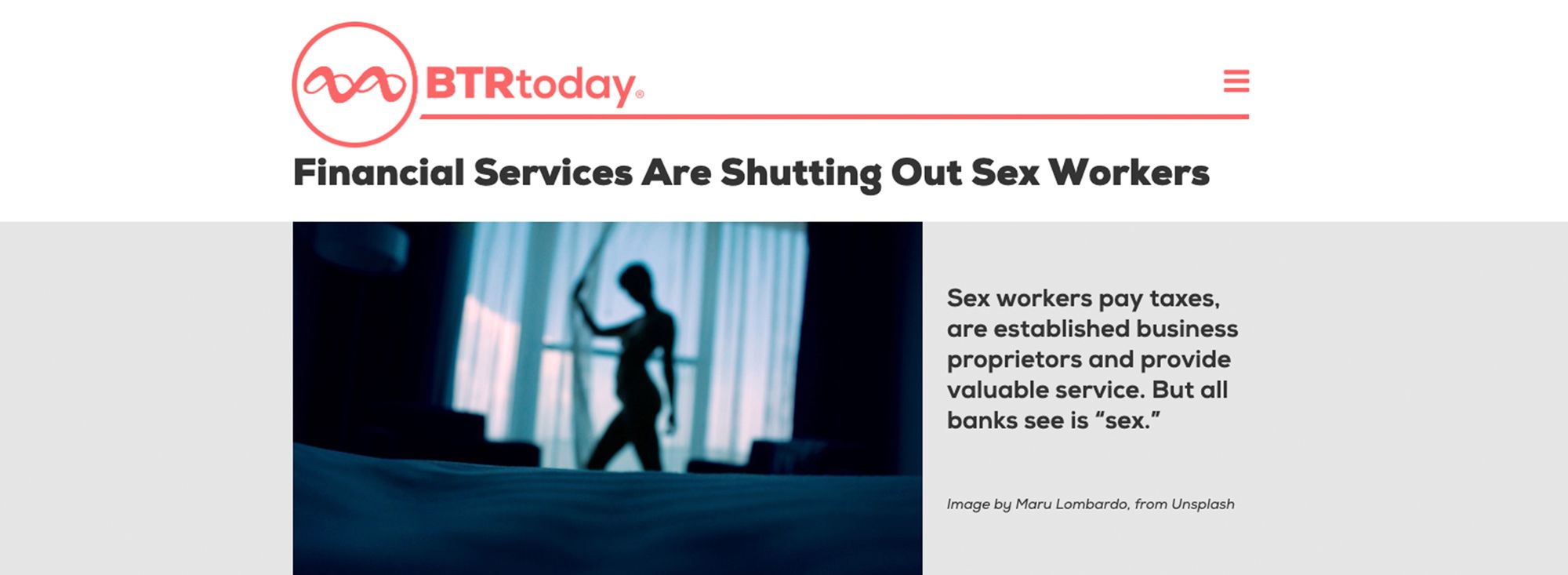Editor's Note: This article was proposed and written before the COVID-19 pandemic altered filing deadlines and other relevant details. It's worth noting that while the filing deadline for federal income tax in the US has been extended, you will still need to file and pay taxes at some point.
There are few human experiences more collectively shared than our hatred of taxes. From the preparation, to the filing, to the actual paying, every step is paired with a nation-wide, collective ire. And while a majority of people agree that they are necessary – responsible for the funding of social services such as public schools and road maintenance – one recent poll found that over a quarter of respondents would get an IRS tattoo in lieu of ever paying taxes again.

Taxes and Income Highlight Unique Barriers
For some sex workers, the barriers can also be simply the fact that taxes support things which are an affront to one’s basic values: “I don’t know how to feel okay about paying taxes when it means that my money is going to the cops, or military, or deporting migrants,” noted one sex worker (who opted not to be named here). “I support education, investigating food, those kinds of things – but knowing how much of my money is going to fund violence is hard for me to swallow.”
Sex workers also face additional barriers unique to informal, criminalized work. For an industry which frequently operates in cash, and under the table, and where many are prohibited from engaging with financial systems like banks and payment transfer apps, the idea of being 'on the books' alone might feel not just unwelcome, but dangerous, especially for those who haven’t been paying or filing taxes each year.
Much of this has led to (and is further fueled by) the assumption that those who participate in the sex trade don’t participate in the tax system, and last year, incels began to weaponize that assumption with what they called the #ThotAudit. In a short-lived, but wide-spread mission of misogyny-based, targeted harassment, a handful of trolls connected on Reddit and 4chan and then began trying to report sex workers’ online accounts to the Internal Revenue Service. Like everything 4chan-based-incels have ever tried to do with women and femmes, the attack withered in its wake, as the “whistleblower” program they were referring to requires legal identifying information, including an alleged violator's tax ID number. The lack of efficacy didn’t mitigate the impact though – some sex workers changed their practices for fear that the IRS would come knocking.
For many sex workers, criminalization and stigmatization has always been a driver to wanting to stay under the radar; staying away from law enforcement and any associated institutions is almost a muscle memory thing for people in the sex trade. In the last few year alone, there has been a growing awareness of the ways that sex workers are being barred from basic financial institutions that others may take for granted. In 2018 BTRToday profiled one sex worker who, after almost ten years with the same bank, had her account flagged and her funds frozen.

"Financial Services Are Shutting Out Sex Workers" via BTR Today
And the stories are not infrequent, nor are they only domestic. In the UK, banks have been called out for discriminating against sex workers, even though selling sex is legal and regulated.
Disciplining and Dispelling the Myths about Sex Work and Taxes
One woman has made a career in trying to help sex workers overcome those fears and get back in the good graces of the IRS, regardless of other criminal penalties for how people are making that money. Lori, known as the Tax Domme, has been working for almost fifteen years for sex workers looking to file their taxes, and has come to it in the way that so many dommes find their niche: seeing an important hole, and realizing you’re the right person to fill it:
“I was laid off from my accounting job and took to phone sex and web camming. I joined a sex work message board for ideas and support. I found sex workers trying to help each other in the areas of business and taxes but were often exchanging wrong information.”
And for Lori, she describes herself very much as still owning both of those roles;
“I force a person’s tax liability to its knees by taking it through its paces with deductions and credits. Secondly, like a good Domme, I guide the tax payer through the process, sometimes kicking and grunting, teaching them what they need to know to be empowered and helping them deal with tax due and other issues.”
Despite this targeting by independent financial institutions, there are a lot of misconceptions about who does and doesn’t care about your income, and Lori spends a lot of time dispelling myths. While banks are keeping their eyes peeled for sex workers, the IRS isn’t: “Filing a tax return correctly with illegal income will result in filing a legal tax return,” she notes, often reminding clients that simply filing taxes aren’t going to set off red flags. “The IRS is prohibited from reporting you to the authorities unless you are already under investigation with them.”
But beyond simply not being in violation of a whole other set of laws which require filing for anyone making an income, there are also benefits to filing taxes, especially for those trying to access other public systems. Filing can be a necessary step towards things like loans for school and housing, or create a paper trail necessary for getting a lease. Not having these paper trails can make sex workers reliant on partners, friends, or even managers and colleagues when they do need to prove income streams, and create a vulnerability which is open to exploitation or harm. There are also benefits for other kinds of payments which are already being made. For folks accessing the benefits of the Affordable Care Act, “Health insurance Market Place payments toward your deductible and payments you have made which can be applied deductions toward your self-employment tax.”
Filing taxes and creating this paper train can be an important step into financial stability and financial independence.
[RELATED: SPECIAL EDITION: Resources and Tips for Getting What's Yours and Staying Safe During COVID-19]
Getting Square with Uncle Sam and Coming Out of the Shadows
The other major concern isn’t just the initial barrier of fear, but simply feeling like it’s impossible – a feeling which can compound after several years of being completely off the books. “It’s been so many years – I wouldn’t know where to start.” Noted one full service provider. The move from being off to onto the books can be one that’s not just scary, but time-intensive, expensive, and bring up internalized or suppressed feelings on money and income.
Lori has some advice, though, for those about to embark on their first tax prep:
First off: Get organized with all of the documents and receipts you have and group them to make the process easier on yourself.
Second: There are plenty of online, downloadable software programs to track those receipts and your income, and to look for deductions. If you’re looking to work with a tax preparer, pull together a profit and loss statement, which will streamline the process a lot.
Lastly: Set up your account with the IRS and get ready to pay your taxes, both quarterly and past. If you’ve got a few years that you’re looking at, start by filing the previous three years and see how that goes. They may not ask you to file more than that.
Filing taxes will probably always be a despised practice. Budgeting, financial planning, and collecting receipts is not a practice many people are taught when they slip into informal work, and sex workers (just like lots of folks who aren't sex workers, too) sometimes come from histories of financial instability. Taxes are one piece of the equation which can force us to really spend time thinking about our relationships to money and financial systems.
But for those who are looking to take this step, the most important thing to remember that there is help, it’s always less scary than you think, and you’re about to join the most collective hatred there is.
You can always find industry friendly and familiar tax preparers and accountants on the Slixa Service Professionals Directory.

